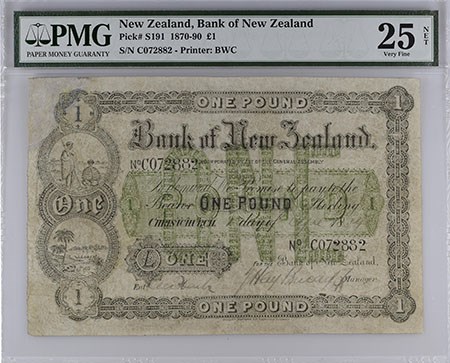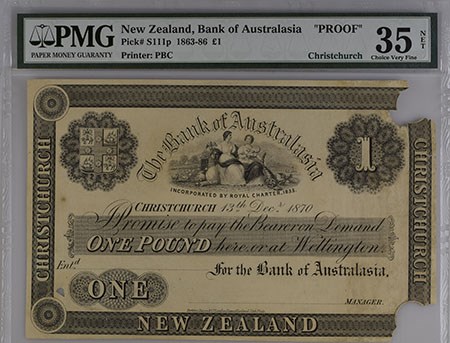History of New Zealand Banking — Part 1
Posted on 7/16/2019
Modern-day New Zealand began with the signing of the Treaty of Waitangi. The treaty was signed by Britain and the Māori people in 1840. The treaty brought the Māori under British rule but would later cause strife due to each side interpreting the treaty differently.
In 1840, any form of currency was hard to come by, but it mainly consisted of coins from various countries brought by traders and sailors to the islands. The newly formed British government couldn’t pay its debts without an adequate supply of money.
Incoming Governor FitzRoy soon realized that New Zealand was hurtling toward a crisis due to the lack of currency. He began issuing currency without the British treasury approval and it wasn’t backed by gold or silver. He did this to prevent the newly formed colony from quickly ending in a financial disaster.
The currency was met with hesitation, as many people didn’t trust debentures not backed by anything. The people of New Zealand used it, but only if nothing else was available — which was FitzRoy’s hope, to have something for exchange rather than nothing. In 1845, FitzRoy was replaced as governor due to his unorthodox approach to currency at the time, and the currency that was issued was withdrawn.
The Colonial Bank of Issue (CBI), was created in 1847 by the local British government of New Zealand but was met with distrust due to its previous attempt to supply its newly acquired colony. From 1840, the Union Bank of Australia could issue its own notes in New Zealand, but this privilege was revoked when the British government wanted to be the sole issuer of currency for the colony.
In 1852, the Union Bank lost its privilege to issue notes, and from 1852 to 1856, CBI was the only bank legally allowed to issue currency. The distrust in the government’s currency led to the CBI closing and to the passing of the Paper Currency Act of 1856. The Act reinstated the Union Bank of Australia’s privilege to issue notes and allowed one other bank, the Oriental Bank, to issue currency. As the colony began to move from a centralized bank in the 1860s, it soon found itself in need of more banking and currency due to an economic boom from the discovery of gold in New Zealand.
As the boom began, New Zealand started passing individual Acts for banks wanting note-issuing privileges. In 1861, the New Zealand Bank Act and the Bank of New South Wales Act were passed, allowing both banks to issue their own notes. As the boom continued, the Bank of Australasia Act, the National Bank of New Zealand Act, and the Colonial Bank of New Zealand Act were all passed through the 1860s and '70s.
 |
|
| New Zealand, Bank of New Zealand, Pick# S191, 1870-90, £1PMG Graded 25 Very Fine NET.Click image to enlarge. | |
In the 1890s, the private banks began to struggle in New Zealand much like the rest of the country. The country’s economy began to slow down but banks were still making risky loans as if the economy were still great. This led to multiple banks needing to be bailed out – otherwise, the currency in circulation for these banks would be null and cause a panic.
New Zealand’s government prevented an economic disaster when the Bank of New Zealand couldn’t pay its debts. The country deemed all currency by the bank was legal tender and backed by the government of New Zealand. This “experiment” was a success and the country learned that the public would accept a bank currency if it was guaranteed by the government even if it’s not payable on demand in gold and silver.
 |
|
| New Zealand, Bank of Australasia, Pick# S111p, 1863-86, £1, "PROOF"PMG Graded 35 Choice Very Fine NET.Click image to enlarge. | |
In 1914, war broke out in Europe, affecting England and, in turn, affecting New Zealand. The country realized the banking system was vulnerable when the war far away still impacted the country. (Look for part two of this article next month to find out about New Zealand’s shift to a central bank in order to provide more stability to its growing economy.)
Sources:
Stay Informed
Want news like this delivered to your inbox once a month? Subscribe to the free PMG eNewsletter today!